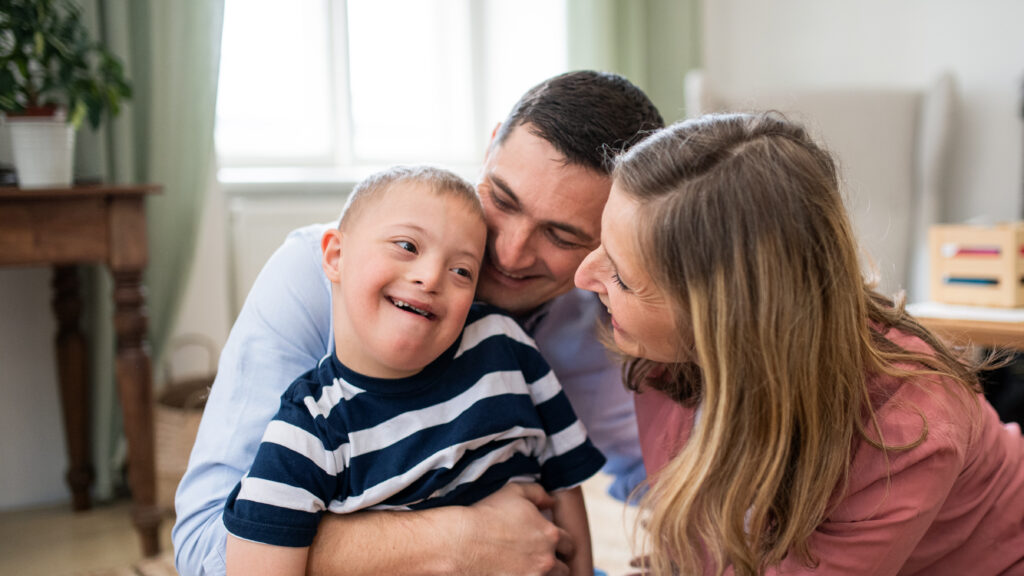
Puberty brings lots of physical, emotional, and mental changes in our bodies. The feelings and developments can be overwhelming for any youth and parent, especially those with special needs.
Navigating this season of growth with your child will bring challenges, but with some preparation and tools, you can help your child through this stage of life.
Our recommendations for guiding a special needs child through puberty are all backed by expert recommendations.
Signs Of Puberty

Puberty begins for most children between the ages of nine and ten and lasts for a few years. Depending on your child’s disability, they may start puberty early, so be sure to discuss this with your doctor.
Visible physical changes include muscle and bone growth and the development of a more adult body. You may also begin to notice that your youth develops body odor or their hair and face become oily more quickly.
As their body grows and develops, they will likely require more sleep. Invisible transformation is also occurring; don’t be surprised if your child seems more emotional, short-tempered, or agitated.
Start The Conversation Early

Your child may start to notice physical changes in themselves as the first sign of puberty. Start the conversation with them about what they can expect as soon as you can. Make sure always to use proper anatomical names of body parts during discussions.
If you struggle with what to say or where to start, consider using books or finding toolkits online to help you walk through the conversation. Using physical 3-D objects and props can also help children understand the correct anatomical names of body parts and where changes will occur.
Be patient with your child and recognize that you will likely have to explain things several times and answer many questions.
Establish Good Hygiene

Help your child to be independent by establishing good basic hygiene routines, such as bathing and teeth-brushing, when they are young. Then, when they hit puberty, they are building on top of already good habits.
Talk with your preteen about areas that will now need some extra care and attention. You may need to demonstrate and oversee self-care initially to ensure that your child uses products appropriately and safely.
It may also be helpful for your child to create a list or picture guide of steps they need to take and how and where products are used.
Encourage Independence

Supply your child with as many tools as possible, such as purchasing menstrual underwear, using a spray instead of roll-on deodorant, or labeling products. For girls, this may mean talking with their doctor about hormonal birth control options that make cycles more predictable and manageable or eliminate them.
Some parents find it helpful to create a ‘kit’ for their youth that contains products such as deodorant, sanitary pads, shaving cream, and razors (if appropriate for your child).
Discuss any accommodations that may be needed with your child’s school to ensure they have the support they need while maintaining their dignity.
Discuss Sex And Appropriate Touch

Remember that just because your child has a disability doesn’t mean they don’t have the feelings and desires of other children going through puberty. Like all youth, they are developing sexual feelings and desires and will begin to recognize that certain touch feels good.
It is essential to talk with your child about how these feelings and desires are normal. Children with special needs can struggle with appropriate social cues and behaviors.
Make sure your child understands that if they choose to pleasure themselves, it is to be done in private in their bedroom and that talking about desires is to be done at home.
It is crucial that you speak to your child about appropriate touch and consent. Unfortunately, children with special needs are at much higher risk for sexual assault and abuse. Talk with your child at length about where on their body it is okay for others to touch and how, before someone touches them, they should give consent. Educate your child on how and when it is appropriate for doctors to feel and that healthcare providers must also ask for consent.
Resources For Parents
If you’re still looking for more answers, we’ve compiled a list of helpful resources that you and your child can use to get them through puberty.
Guide to Autism and Puberty: https://www.myautism.org/informational-kits/the-official-puberty-guide
Healthy Bodies Toolkit for kids with disabilities: https://vkc.vumc.org/healthybodies/
Puberty, Sex and Sexuality for Autsitic Teens: https://vkc.vumc.org/assets/files/resources/sexedtoolkit.pdf
Special Needs Teens and Puberty: https://www.uwhealth.org/news/puberty-teens-special-needs